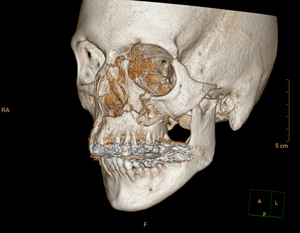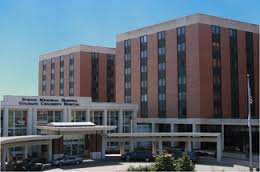About the Program
The mission of the University of Rochester OMFS program is to:
- Heal: Provide Excellent Patient Care
- Teach and Learn: Provide Excellent Training in Oral and Maxillofacial Surgery; Learn Through Collaboration
- Discover: Engage in Meaningful-High Quality Research
- Create: A Premier Program in the Country both academically and clinically
Learn more about the Oral and Maxillofacial Surgery Postgraduate Residency Training Program
 The goals of the program are:
The goals of the program are:
- Put the patients’ needs and care first
- Teach evidence based OMFS and 'cutting edge' surgical techniques to our trainees
- Create an atmosphere of continual learning and progressive development of judgment
- Contribute to the advancement of the specialty
The OMFS program offers the following:
- 4 year Certificate OMFS program
- 6 year integrated M.D./Certificate OMFS program
- 4 year Certificate OMFS Program - MS
- 4 year Certificate OMFS program-EMBA
- The EMBA will not interfere with the duration, the experience nor the responsibilities of the trainees. The OMFS program at the University of Rochester is offering an Executive Master in Business Administration (EMBA) degree along with the OMFS Certificate program.
- The EMBA degree will be offered to one resident in the 48 month OMFS certificate program.
- The EMBA will be earned from the Simon School of Business at the University of Rochester
- The EMBA will be earned within 3 years.
- 1 year Non-Categorical OMFS Internship
- OMFS Externship
Eastman Institute for Oral Health's Oral and Maxillofacial Surgery postgraduate residency training program is located at the ambulatory center of Strong Memorial Hospital, the main teaching hospital of the University of Rochester. Strong Memorial Hospital is the first hospital in the country to be affiliated with a medical school.

In 1910, Abraham Flexner, under the auspices of the Carnegie Foundation for the Advancement of Teaching, published a report on medical schools that led to a major transformation in how medicine was taught across the country.
URMC and Strong Memorial Hospital were developed from the concept of establishing a medical school at a university that would utilize Flexner’s revolutionary ideals in medical education. The medical school opened its doors in 1925, and less than a year later, Strong Memorial Hospital followed suit. Strong Memorial Hospital, the Eastman Institute for Oral Health, Highland and Rochester General hospitals, are the training sites for the OMFS residents.
Throughout its history, the OMFS program at URMC-EIOH has trained maxillofacial surgeons who practice the full scope of the specialty, serve their communities and have become leaders in our field. During their training, they become proficient in: performing complex dentoalveolar surgery, implant and pre-prosthetic surgery, corrective jaw surgery, TMJ surgery, management of benign pathologic conditions of the maxillofacial skeleton and maxillofacial trauma. Through interdepartmental collaborations with key surgical departments within URMC, the OMFS residents are educated in managing patients with craniofacial deformities as well as facial esthetic needs.
The program has undergone several changes in its leadership in the recent years. The focus of the current leadership is to incorporate state-of-the art surgical training with an unparalleled education in patient evaluation and management. The goals and objectives of the Oral and Maxillofacial Surgery Department are to provide quality Oral and Maxillofacial Surgery training and patient care. Resident education is a process of continual evaluation, development, and improvement, with increased levels of responsibility throughout the program.
Key advances in the future of the program that are already in effect with the new leadership are:
- First and foremost the development of a strong didactic curriculum with scheduled conferences that include weekly Grand Rounds and Case Conference, monthly Journal Club and Morbidity Mortality Conference that aim to teach evidence-based surgery and medicine
- Engagement in high quality research and enhancement of the scholarly activity for all residents and faculty by establishing key collaborations within the institution as well as outside
- The advancement of the specialty by contributing to high quality publications in peer reviewed journals
- Expanding current residency training by incorporating management of maxillofacial oncology patients by Dr. Dina Amin, for both ablative and reconstructive needs, as well as incorporating the latest technological advances available to the specialty.